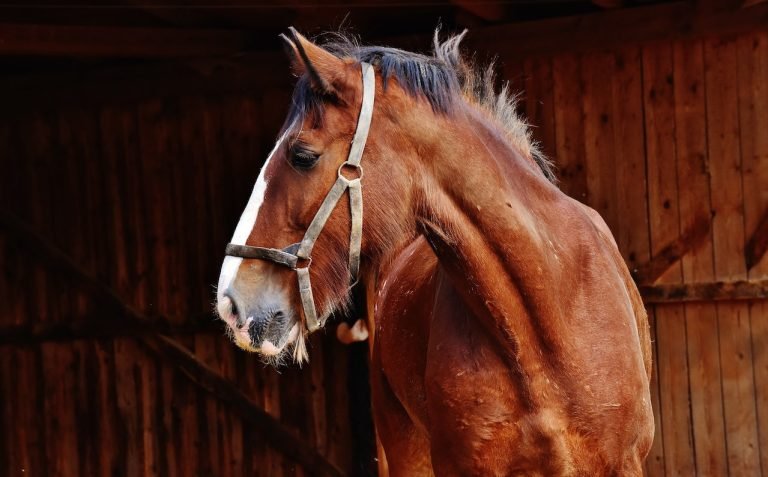
Formerly known as the MBTI (Myers-Briggs Type Indicator), the MBTI is an acronym for four personality types:
J: Judging
P: Perceiving
S: Sensing
T: Thinking
These four personality types have initially been developed by Dr. J. G. Myers and Dr. R. H. McCaulley in the 1940s. The Myers-Briggs personality type test is still used today by millions of people worldwide.
Personality Type?
Have you ever noticed that some people have a hard time selecting the right horse breed for them? Perhaps you’re one of those people, and you’re wondering which horse breed best matches your personality type.
Whether you’re a self-proclaimed “Jack of all trades” or “Queen of one,” the Myers-Briggs personality type can help you determine which horse breed matches your personality.
We’re going to take a look at some personality types, and we’re going to look at some of the horse breeds that are well-suited to each personality type.
As I have noted, these are generalizations. There are exceptions to every rule. But the general rule is that the horse breeds that are well-suited to a personality type will have similar personality traits.
For example, a very open-to-experience person is more likely to be attracted to horse breeds that are more open to understanding.
For example, the Shire horse is one of the horse breeds best suited to the INFJ personality type.
In this article, we will look at some personality types and their corresponding horse breeds.
As I have noted before, there are four personality types in the Myers-Briggs personality type system:
INFP: The Mediator (Introverted, Intuitive, Feeling, Perceiving)
INFP (introversion, instinct, feeling, understanding) is a four-letter acronym for one of the 16 personality types identified by the Myers-Briggs Type Sign.1 The INFP personality type is commonly referred to as an “optimist” or “arbitrator” individuality. Individuals with this personality type tend to be introverted, radical, imaginative, and driven by high worth.
INFPs also have a solid interest rate in making the world a better place. Along with intending to acquire a higher understanding of themselves and exactly how they suit the globe, they are likewise interested in how they can best assist others. People with this personality type invest a lot of time exploring their purpose in life and thinking of exactly how they can use their abilities to best offer humanity.
Cognitive Features
The MBTI itself is based upon a concept of character developed by the Swiss psychoanalyst Carl Jung.3 He recommended that there are four mental parts of character: reasoning, sensation, instinct, and feeling—people after that route each of these cognitive features inwardly (withdrawn) or externally (extraverted).
In the MBTI, each personality type comprises a hierarchical stack of these functions. The dominant feature significantly controls a character, although it is likewise sustained by the auxiliary and, to a lower degree, the tertiary functions. Substandard parts are those that are primarily unconscious yet still apply some impact.
INFPs often tend to rely upon adhering to four cognitive functions:
Leading: Shy Feeling.
INFPs experience an excellent depth of feelings, yet they mainly process these emotions inside as artists. They possess an extraordinary sense of questioning the world and feel great compassion and empathy for others. While these feelings are solid, they tend not to reveal them ostensibly, which is why they can often be misinterpreted as unresponsive or unwelcoming.
Accessory: Extraverted Intuition.
INFPs explore situations using creative imagination and ‘what happens if scenarios, commonly analyzing a variety of possibilities before picking a course of action. Their inner lives are a dominant force in their personality, and they also engage with the outdoors by utilizing their intuition.
They concentrate on the “big picture,” and things will form the future program. This ability assists make INFPs transformative leaders thrilled about making favorable changes in the world.
Tertiary: Introverted Noticing.
When absorbing details, INFPs develop vivid memories of the events. They will usually replay these events in their minds to evaluate experiences in much less stressful setups. Such memories are typically related to strong feelings, so recalling a memory can commonly feel like experiencing the experience itself.
Inferior: Extraverted Reasoning.
This cognitive function entails making and arranging sense of the world objectively and logically. While this is a largely unconscious influence on the INFP’s character, it can dawn in times of pressure. When confronted with stress and anxiety, an INFP could become unexpectedly really pragmatic and detail-oriented, concentrating on logic instead of emotion.
INFPs can, in some cases, struggle to feel efficient and effective since they are typically ruled even more by intuition and emotion. Discovering to develop of the extraverted thinking feature can aid people with this personality type to create a much better sense of balance.
Individuals with this character type spend a great deal of time exploring their purpose in life and believing that they can use their abilities and skills to best offer humankind.
In the MBTI, each character kind is made up of an ordered stack of these features. The dominant feature mostly manages individuality, although it is likewise sustained by the accessory and, to a lesser degree, the tertiary features. INFPs experience an excellent deepness of feelings; however, they mainly refine these emotions internally as artists. While this is an intensely unconscious influence on the INFP’s individuality, it can reveal itself in times of stress.
ENFP: The Optimist (Extroversion, Intuition, Feeling, and Perceiving)
ENFP is an acronym used in the publications of the Myers-Briggs Type Indication to describe one of sixteen personality types. The MBTI assessment was developed from the work of famous psychiatrist Carl G. Jung in his publication Mental Kinds. Jung suggested an emotional typology based on cognitive functions that he developed with his professional monitoring.
From Jung’s work, others developed emotional typologies. Jungian personality assessments consist of the MBTI analysis, established by Isabel Briggs Myers and Katharine Cook Briggs, and the Keirsey Personality Sorter, established by David Keirsey. ENFPs are outgoing and innovative, with the critical ability to regard complicated patterns and information and absorb it swiftly.
They are versatile, very adaptable workers. They are driven by a keen commitment to their ideals and a solid drive to assist others. Much less created are their perseverance for regular jobs, as well as a projection of a significant, committed photo. The least extroverted of the exhibitionist kinds, ENFP require substantial time alone to center themselves and see to it they are moving in a direction that remains in sync with their values.
ISFP: The Artist and Adventurer (Introverted, Sensing, Feeling, Perceiving)
Secret ISFP Attributes
ISFPs like to maintain their alternatives open, so they usually postpone making decisions to see if points may change or if new options come up.
According to Myers-Briggs, ISFPs are kind, friendly, silent, and delicate. Unlike extroverts who get energy from connecting with other people, artists need to use power around others.2 After hanging around with individuals, introverts usually locate that they need a period alone. Because of this, they typically favor intermingling with a small team of buddies and relatives.
While they are peaceful and scheduled, they are also recognized for being friendly, caring, and considerate. ISFPs have a carefree perspective and tend to approve of other people as they are.
ISFPs like to focus on the information. They invest more time thinking of the here and now rather than worrying about the future.
ISFPs tend to be “doers” as opposed to “dreamers.” They dislike abstract theories unless they can see some sensible application for them and discover situations that include acquiring hands-on experience.
Cognitive Features
The MBTI recognizes four crucial cognitive features (reasoning, sensation, intuition, and also sensing) that are either routed externally (extraverted) or inwardly (shy).3 The ordered order of these features identifies each person’s distinct character.
Leading: Withdrawn Feeling
ISFPs care more about personal concerns than a goal, or sensible info.
Individuals with this personality type manage information and experiences based on how they feel concerning them.
ISFPs have their very own value system and produce spontaneous judgments based on exactly how points fit with their very own suggestion.
Accessory: Extraverted Sensing
People with ISFP individualities are significantly in tune with the globe around them. They are in harmony with sensory information and are acutely mindful when tiny changes occur in their immediate settings. Because of this, they usually position a high emphasis on visual appeals and appreciate the arts.
They are concentrated on the here-and-now moment, absorbing new details and, after that taking action. They have a strong sense of their immediate surroundings, usually observing small information they may ignore. When remembering occasions from the past, they can recall strong aesthetic images and sights, smells, and sounds that can stimulate powerful memories related to those senses.
Tertiary: Shy Instinct
This function often runs in the background, feeding off the extraverted picking-up function.
As ISFPs take in details regarding the globe, they typically establish a “sixth sense” regarding occasions and scenarios. While they usually do not include abstract concepts or concepts, this introverted instinct feature might lead them to experience epiphanies concerning themselves and others.
Inferior: Extraverted Reasoning
One weakness that ISFPs might have remained in arranging, although they may use this feature differently prominently in particular circumstances.
This function is everything about looking for the most effective means to do something. An ISFP may concentrate on being specific regarding the details and locating the most efficient means to express an idea.
Relationships
ISFPs are shy. They tend to be reserved and peaceful, specifically around individuals they do not know well. They prefer spending quality time with a close group of family and friends.
ISFPs are private and maintain their real feelings to themselves. In some cases, they might avoid sharing their thoughts, feelings, and also point of view with other individuals in their life, even their charming companions. They typically defer to the needs or demands of others since they Favor not sharing their innermost feelings and try to prevent disputes.
ISFPs have solid values yet are not worried about encouraging other people to share their points of view. They care deeply about other individuals, specifically their closest family and friends. They are action-oriented and tend to reveal their care and problem through action instead of discussing sensations or sharing sentiments.
Occupation Paths
People with ISFP individualities like animals and have solid gratitude for nature. They may seek tasks or leisure activities that place them touching the outdoors and animals.
Because ISFPs choose to concentrate on today, they typically succeed in occupations worried about practical, real-world problems. Jobs that offer a good deal of personal flexibility and freedom are especially attracting ISFPs.
According to Myers-Briggs, ISFPs are kind, pleasant, peaceful, and sensitive. Individuals with ISFP personalities are very in tune with the world around them. ISFPs are shy. ISFPs are very private and also maintain their true feelings to themselves. ISFPs have solid worth but are not concerned with encouraging other people to share their point of sight.
ESTP: The Persuader (Extraverted, Sensing, Thinking, Perceiving)
A Business Owner (ESTP) has the Extraverted, Observant, Thinking, and Prospecting characteristic. They tend to be action-oriented and energetic, deftly browsing whatever is in front of them. They enjoy revealing life’s chances, whether socializing with others or in extra personal searches.
Riders constantly affect their instant environments– the very best method to identify them at a celebration is to try to find the whirling swirl of individuals flitting concerning them as they move from team to group. Laughing and delighting with blunt and earthy humor, Business owners individuals enjoy being the center of attention. Riders volunteer a reluctant close friend if a target market participant is asked to come on phase.
Concepts, abstract ideas, and treading discussions regarding international issues and their ramifications don’t keep Riders interested for long. Entrepreneurs maintain their conference energized, with an excellent dose of intelligence, yet they like to speak about what is– or even better, to head out and do it. Entrepreneurs leap before they look, repairing their errors as they go instead of sitting still, preparing backups as well as escape clauses.
Diving Right In
Riders are the likeliest personality type to make a living from risky actions. Individuals with Entrepreneur individuality take pleasure in pleasure, interest, and dramatization, not for psychological thrills, but since it’s so stimulating to their logical minds.
It isn’t because they aren’t smart and can do well, but the disciplined, talking technique of official education and learning is just so far from the hands-on knowledge that Entrepreneurs appreciate. It takes a large amount of maturation to see this procedure as a necessary way to an end, creating more exciting chances.
Also tough is that to Entrepreneurs, it makes more sense to use their ethical compass than others. Rules were made to be broken.
The Course Less Travelled
With maybe the wisest, unfiltered view of any kind, Entrepreneurs have a one-of-a-kind ability to notice minor changes. Entrepreneurs use this monitoring immediately, calling out the difference and asking inquiries, often with little respect for sensitivity.
If Riders aren’t cautious, though, they might obtain as well caught in the moment, take points also far, and also run roughshod over more sensitive people, or forget to care for their very own health and wellness. There are just enough Entrepreneurs available to keep points spicy and competitive, and not a lot of them cause a systemic risk.
Riders have lots of interest and power, complemented by a reasonable, sometimes sidetracked, mind. Inspiring, persuading, and vivid, they are natural group leaders, pulling everyone along the course much less traveled, bringing life and excitement anywhere they go. Placing these high qualities to a fulfilling and valuable end is Entrepreneurs’ actual obstacle.
An Entrepreneur (ESTP) is somebody with the Extraverted, Observant, Reasoning, and Prospecting individuality traits. Entrepreneur characters enjoy being the center of focus by giggling and delighting with blunt and natural humor. Entrepreneurs are the likeliest individuals kind to make a lifestyle of dangerous actions. Individuals with the Entrepreneur personality appreciate dramatization, pleasure, and passion, not for emotional delights but because it boosts their rational minds. Problematic is that to Entrepreneurs, it makes more feel to use their moral compass than someone else’s.
Conclusion:
The above-discussed personality types and their relation to horse breeds can be different and unique. We can say there is a close relationship between a specific personality type and horse breed because if the person or rider is introverted, he will like the species, which will be introverted, and so on.






